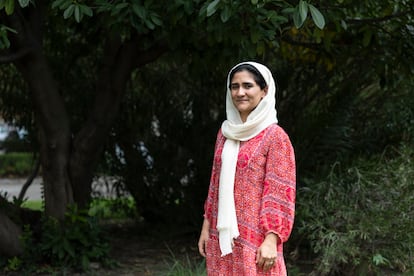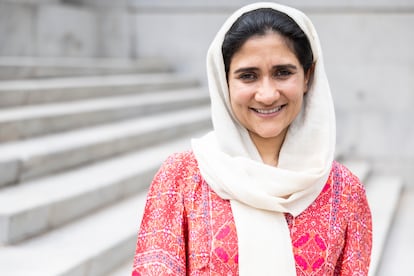Afghan activist Shabana Basij Rasikh: ‘My family sent me to a secret school dressed as a boy’
The educator established a school for girls in Kabul and relocated it to Rwanda in 2021 when the Taliban returned to power


Shabana Basij Rasikh chokes up and stops talking for a moment. While in Madrid to receive a UNICEF Spain 2023 award, her emotions briefly interrupted a heartfelt description of the School of Leadership, Afghanistan (SOLA). Tears well up in her eyes as she reflected on the resilience and bravery of the young Afghan girls who study at the school she founded in Kabul, and later relocated to Rwanda in August 2021 when the Taliban returned to power. She continues to bring Afghan girls to SOLA in Rwanda and is developing an online program for those who cannot attend in person.
Question. Would you tell an Afghan girl to follow your parents’ example and attend a secret school?
Answer. You know, as someone who did it, I can say yes. But I must say it’s an incredibly personal decision because taking that kind of risk is not easy. It’s scary, and the consequences are severe — no one wants to face the Taliban and their brutality.
Q. You did it.
A. Yes. I remember when my family took that risk and sent me to a secret school dressed as a boy. I remember being scared and thinking how unfair it was that my parents had to make that decision. But I only understood the value of that decision years later, when the Taliban regime fell and I was able to return to public school.
Q. Why?
A. I found myself in a classroom where most of my classmates were six years older than me. And it was the first time I was aware of the gift my parents had given me by risking their lives and our lives [referring to her sister]. Because when I went to school, my thinking and my aspirations changed.
Q. In what sense?
A. I started envisioning a bright future as an independent woman, taking charge of my own life and making my own decisions. I owe it all to the courage of Afghan women who, in the 1990s, secretly welcomed girls into their homes for education. They were aware that of the severe consequences if they were discovered.
Q. History is repeating itself…
A. Yes, the Taliban have regained power and imposed restrictions on girls attending secondary school and women pursuing higher education and employment. However, amidst these challenging conditions, women have taken it upon themselves to teach girls and pass on their knowledge to the younger generation. Women and girls are at the forefront of the fight against the Taliban regime, while millions in the country are suffering from hunger. Despite these dire circumstances, girls and their families are actively seeking opportunities to pursue education.
Q. What impact will the Taliban ban have?
A. The consequences of neglecting girls’ education will have far-reaching effects, affecting not only the girls but everyone. Investing in girls’ education benefits not just girls, but also boys, men, and society as a whole. Educated girls tend to marry later and have fewer children, leading to improved health outcomes. Research shows that educated women typically allocate over 90% of their income to their families, fostering healthier and more prosperous lives for both their families and communities.

Q. After the Taliban took over the country in August 2021, you managed to move the school to Rwanda. How did you do it?
A. It wasn’t easy, but I am very grateful for the absolute generosity of the Rwandan government. We were able to safely bring over every member of our community. As we got off the plane, we were greeted by health officials and trauma counselors — none of us saw immigration officers at the airport. We just went straight from the airport to the facility we had rented to be our future campus.
Q. No immigration officials?
A. They came a few days later to process the paperwork and give us residence cards. The incredible support we received in the most difficult of times reminded me that it takes bold leadership from a lot of countries around the world to look at refugees differently, as people who have been forced to leave home.
Q. What did you do with your school in Afghanistan?
A. As we were getting ready to leave the country, the parent of one of our students asked me to burn all the school records for his daughters before the Taliban took power. He feared repercussions if the information was discovered. I agreed and destroyed every bit of evidence to protect our students’ families.
Q. What is life like in Rwanda for Afghan students?
A. This is the second year we have brought girls here from Afghan communities around the world. They are young and resilient individuals, facing the daily challenges of being away from their families. Yet, their courage is truly admirable and their thirst for knowledge is undeniable. They understand their important role in Afghanistan’s future, and when the time comes, they will return to seize the opportunity.
Q. You are also developing an online SOLA program. How many girls do you think it will attract?
A. This year, we received nearly 2,000 applications from Afghan girls in 20 countries for our school in Rwanda, but we could only admit between 20 and 30. So we looked at how to bring our school to them. That’s why we are launching this online initiative to provide education to thousands and thousands of Afghan girls this year, and for many years to come. It is in no way a substitute for attending in person, but it is a way to give them an education and instill hope in the future, that the darkness of the Taliban will not last forever.
Sign up for our weekly newsletter to get more English-language news coverage from EL PAÍS USA Edition
Tu suscripción se está usando en otro dispositivo
¿Quieres añadir otro usuario a tu suscripción?
Si continúas leyendo en este dispositivo, no se podrá leer en el otro.
FlechaTu suscripción se está usando en otro dispositivo y solo puedes acceder a EL PAÍS desde un dispositivo a la vez.
Si quieres compartir tu cuenta, cambia tu suscripción a la modalidad Premium, así podrás añadir otro usuario. Cada uno accederá con su propia cuenta de email, lo que os permitirá personalizar vuestra experiencia en EL PAÍS.
¿Tienes una suscripción de empresa? Accede aquí para contratar más cuentas.
En el caso de no saber quién está usando tu cuenta, te recomendamos cambiar tu contraseña aquí.
Si decides continuar compartiendo tu cuenta, este mensaje se mostrará en tu dispositivo y en el de la otra persona que está usando tu cuenta de forma indefinida, afectando a tu experiencia de lectura. Puedes consultar aquí los términos y condiciones de la suscripción digital.








































